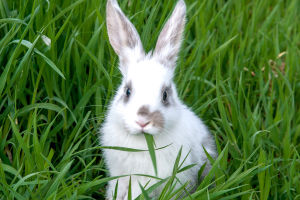If you've ever seen a rabbit's soft fur, twitching nose, and big, curious eyes, you've probably thought about how cute they are. But beyond their adorable looks, rabbits can also make fantastic companions for children. They're playful, gentle, and surprisingly easy to care for—qualities that make them great pets for families.
But, before jumping into bringing one home, you might be wondering: Can rabbits really be good pets for kids? Will they bond with your child? And how do they contribute to your child's development? Let's explore what makes rabbits wonderful partners for kids and the responsibility involved.
1. Rabbits Teach Responsibility
One of the most significant benefits of having a rabbit as a pet is the sense of responsibility it can instill in children. Caring for a pet, even one as small as a rabbit, requires daily attention. From feeding and cleaning to providing them with water and exercise, these tasks teach children important life skills.
Here's how rabbits promote responsibility:
1. Daily Care: Kids can learn the importance of feeding their rabbit at regular intervals and keeping its living space clean. This teaches time management and commitment.
2. Health Monitoring: Children can learn how to check for signs of illness and how to ensure their rabbit is healthy. This promotes empathy and attention to detail.
3. Routine Building: Having a pet with a consistent routine helps children establish their own healthy habits, like taking care of something other than themselves.
Caring for a rabbit offers children a hands-on lesson in responsibility and teaches them to look after something other than their own needs.
2. A Calming, Low-Maintenance Pet
Rabbits make great companions because they are relatively low-maintenance compared to other pets. Unlike dogs, they don't require constant attention or long walks. They're also quieter, making them ideal for families who live in apartments or smaller spaces.
Here's why rabbits are calming and manageable:
1. Quiet Companions: Rabbits are known for their quiet nature. They don't bark or make loud noises, making them ideal for kids who need a calming presence.
2. Independent, Yet Affectionate: While rabbits are social animals, they don't require as much attention as a dog. They can entertain themselves with toys and are happy to snuggle for short periods, giving kids space to focus on other activities.
3. Easy to Care For: Rabbits generally don't need much beyond basic care—feeding, cleaning, and playtime. They're perfect for kids who are learning to take care of pets without feeling overwhelmed.
Rabbits provide a relaxing presence, making them a good fit for kids who need companionship without excessive energy.
3. A Source of Emotional Support
Rabbits are known to form bonds with their owners, and many children find comfort in having a rabbit as a companion. They offer unconditional love and can be a source of emotional support, especially for kids who might be shy, anxious, or going through tough times.
Here's how a rabbit can emotionally benefit kids:
1. Calming Presence: Just petting a rabbit can lower stress levels. The act of holding and petting an animal can trigger the release of oxytocin, the hormone that promotes feelings of love and calm.
2. Emotional Connection: Rabbits, though independent, can show affection by hopping into your lap or sitting beside you. This bond can teach kids about empathy and emotional connections.
3. Safe Space: Rabbits can offer children a sense of companionship without demanding much. This makes them perfect for kids who need a gentle and non-judgmental companion.
Having a rabbit as a pet gives children the opportunity to learn about caring for others while also providing them with a comforting friend during stressful moments.
4. Fun for the Whole Family
Rabbits are naturally curious and playful, which can make them entertaining pets. Children and even grown-ups can enjoy watching them explore, hop around, and interact with toys. Additionally, some rabbits are very social and can learn tricks or follow commands, which adds an extra layer of fun.
Ways your family can interact with a rabbit:
1. Playtime: Rabbits enjoy interactive play. You can create simple obstacle courses with tunnels or toys and watch your rabbit hop through them.
2. Training Sessions: Some rabbits can be trained to do tricks, like coming when called or hopping through hoops. This is a fun bonding experience for kids.
3. Watching Them Explore: Kids can enjoy just watching their rabbit explore its space. It sparks curiosity and encourages kids to observe the behavior of their pet.
The playfulness of rabbits can bring laughter and joy to family members, making them a fun and engaging pet.
5. Health Benefits of Having a Rabbit
Rabbits not only teach emotional and physical responsibility but also contribute positively to your child's health. Caring for a rabbit involves regular interaction, which encourages movement and physical activity.
Here's how rabbits promote health:
1. Encouraging Active Play: Kids enjoy letting their rabbits hop around and interact with them. This encourages physical movement and time away from screens.
2. Stress Relief: Spending time with a pet like a rabbit has been shown to lower blood pressure and reduce feelings of anxiety.
3. Increased Focus: Taking care of a rabbit can also improve concentration. Kids who interact with animals often show better focus and attention in other areas of life.
A rabbit is a great way to encourage physical activity and reduce stress, all while fostering emotional development.
Rabbits are wonderful pets for kids, offering both fun and meaningful companionship. They're low-maintenance, provide emotional support, and teach kids responsibility in a gentle way. Whether it's the calming effect of their presence or the joy of watching them play, rabbits can enrich a child's life and promote a sense of well-being. If you're considering a pet for your child, a rabbit could be the perfect choice to bring joy, companionship, and valuable life lessons into your home.


